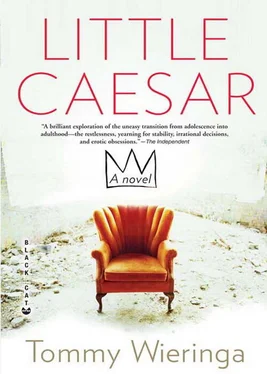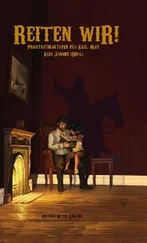Castrum had been a port town even in Roman times. The pride of Alburgh’s museum was a scale model of the city, which also illustrated its gradual disappearance. Dotted lines showed how the coastline had run in former times, how it had kept moving up — Kings Ness was now its extreme western border. Each of the dotted lines was marked with a year: 1286, 1342, 1740, 1953. Hundreds of storms had raged through the centuries, but that handful of dates was important, for it was then that storms of exceptional violence had taken place. Great damage had been caused in those years, the coastline had changed drastically. Starting in 1740, the dotted line ran outside the western limit of the town and one could no longer really speak of a Castrum at all.
It had been a large town, covering more than a square mile at its peak. There were four gates, protected by palisades and reinforced earthen walls. Castrum owed its prominence to its harbor, the largest in eastern England. At the height of its prosperity it had served as home port to eighty trading vessels, its fishing fleet went as far afield as Iceland. The town’s elite wore clothes of Flemish linen and drank French wines. Wood for its ships came from the Baltic. The streets were peopled by merchants from Antwerp, Stavoren and Kiel. It was a city one visited to go to the market, to get drunk down at portside and exchange blows with a boatswain from Jutland. Down there were also the workshops of master guildsmen and tanners and smiths. The houses of Castrum were made of wood, its houses of prayer and its abbeys of stone. Outside the town were the fields and the herds, but Castrum’s lifeblood was trade — the multilingual, noisy trade of the North Sea.
On New Year’s Eve in 1286, a powerful northeasterly storm blew in. It was spring tide. A thick embankment of gravel was forced up by the waves at the mouth of the harbor; the entrance was blocked, ships could only make port at high tide. The people were unable to dredge a new channel. Castrum lost some of its importance to competing harbors. For the first time, the city saw more people leave than come in. Its inhabitants were seeking their fortunes elsewhere. And maintenance of the seawall, that work of many hands, was neglected.
Then came the night of 14 January 1342. Masses of water, whipped up by the wind and the moon’s pull, crashed against the east coast. The storm shoved the water out in front of it. A town lay in its way. Houses in the port district were torn apart, their inhabitants escaped to the upper city with whatever they could carry. Waves leapt up meters high, as though the sea were tossing lassoes after them. By the moonlight breaking occasionally through the coursing cover of clouds that night, the people watched all their earthly possessions being lost. The wailing storm blew in their faces salty rain and sulfurous yellow clots of foam, churned down below in the vaults of hell.
By morning light they saw the ruins of houses, customs sheds, inns, warehouses, wharfs — all of it shattered by the incessant pounding. All that was left of St. George’s were the walls and the belfry; graves had been washed open, their horrific contents now revealed to the light of day.
In the centuries that follow the city’s role dwindles steadily. By the seventeenth century, Castrum is only a quarter of its original size. Many of the original inhabitants have moved to a nearby hill, where they have founded a town by the name of Alburgh. Old Castrum and new Alburgh become locked in a bitter struggle for scarce means.
December 1740 arrives. A powerful northeasterly wind has been blowing for days. It is very, very cold. The wind swells to storm velocity. Masses of water again pile up before the coast and come thundering down on the cliffs on which Castrum’s last remains are standing.
A priest, William Mason, who led his last service in St. Paul’s a few days earlier, documented the consequences of that storm. St. Paul’s, Castrum’s largest church, is torn apart by the waves. Its eastern wall collapses. A few days later the belfry falls as well. When the sea calms at last, Mason sees that the waters have laid bare the foundations of buildings long forgotten. Old wells hidden by the soil till then rise from the ground like chimneys. What is left of the town is strewn with stones, crabs and fish. Rivulets of water race down the streets on their way back to the sea. Mud everywhere. The penetrating stench of rotting. The parade grounds are flooded, and that spring the sea asters blossom inland. Freshwater springs have turned silty. The Church of the Holy Trinity, atop the cliff, has lost its nave. The bell tower is all that remains standing. Bones stick out of the cliff, human skulls are found on the beach.
The belfry of the Church of the Holy Trinity is a story in itself. For decades it stood miraculously alone, then sank slowly under its own weight from the cliff onto the beach, where it remained upright — a wonder documented in the annals, paintings and drawings of the day: a lone, arthritic index finger, warning of a fate that had happened long ago.
In nasty weather they say you can still hear the bells of the Holy Trinity ringing in the waves.
When my mother had finished doing my makeup, I would go to my room. The cloud in my chest hot and blood red. I lay down on the bed and unbuttoned my trousers. My head on the pillow I tightened the muscles in my neck — fluttering images on my retina, up to and including the spasms. The minor shame afterwards, mild as a shake of the head.
There was a life before and a life after the discovery of sperm. I masturbated as though possessed. I ejaculated into dirty socks, towels and the insides of trouser legs, I even ate it when there were no jack-off rags to be had.
The obscene thoughts about my mother, her role in my fantasies, ended one week after my fifteenth birthday. A postcard, with stamps from a faraway country, in a hand I did not recognize, landed in our letterbox. Addressed to me, albeit with the wrong surname. To Ludwig Schultz it read, as though the card was not written but dedicated to me. Schultz was my father’s surname; in England my mother had had it replaced with her own. The text of the postcard consisted of one line, only two words: Love me .
I brought the card to my mother. She took it and read it. In any icy voice she said, ‘From your father.’
My father had sent me a card! I now deciphered the scribble beneath the text as Bodo . He knew I existed, he had spoken my name! And he had given me an assignment. Love me. That was the when the shame fell like an axe. Love me , it said. Not her, his wife, but him, my father. With that barebones message Bodo Schultz had renewed his claim upon her. From far, far away he had read my filthy thoughts, he had looked into the secret chambers. With the postcard, taboo suddenly stood like a pillar of lead between me and my mother. Those two words were his warning, but with the warning also came the absolution: were I to mend my ways he would requite my love with his own. All this lay encrypted in that Love me .
My father’s card gave me a father. A man with handwriting, a hand that wrote, an arm with which he waved to me from a distance, a torso in which beat a heart that might just have kept a place for me.
The front of the card showed a statue of a man. A copper pirate, he had one arm and one leg and was brandishing a cutlass above his head. He was cleaving the deathly blue sky in twain. The yellowish cardboard on the back bore the imprint Cartagena de Indias , and Estatua Blas de Lezo . That must be the pirate’s name, I realized, Blas de Lezo. The postmark told it had been mailed two weeks earlier, one week before my birthday. Perhaps my father had intended it as a birthday card — an assumption that made me happy. He had gone to the trouble to find out where I lived; who knows how many cards he might have posted throughout the years? To Alexandria, for example? Perhaps there was a pile of them waiting for me there, bound up with a red ribbon?
Читать дальше












